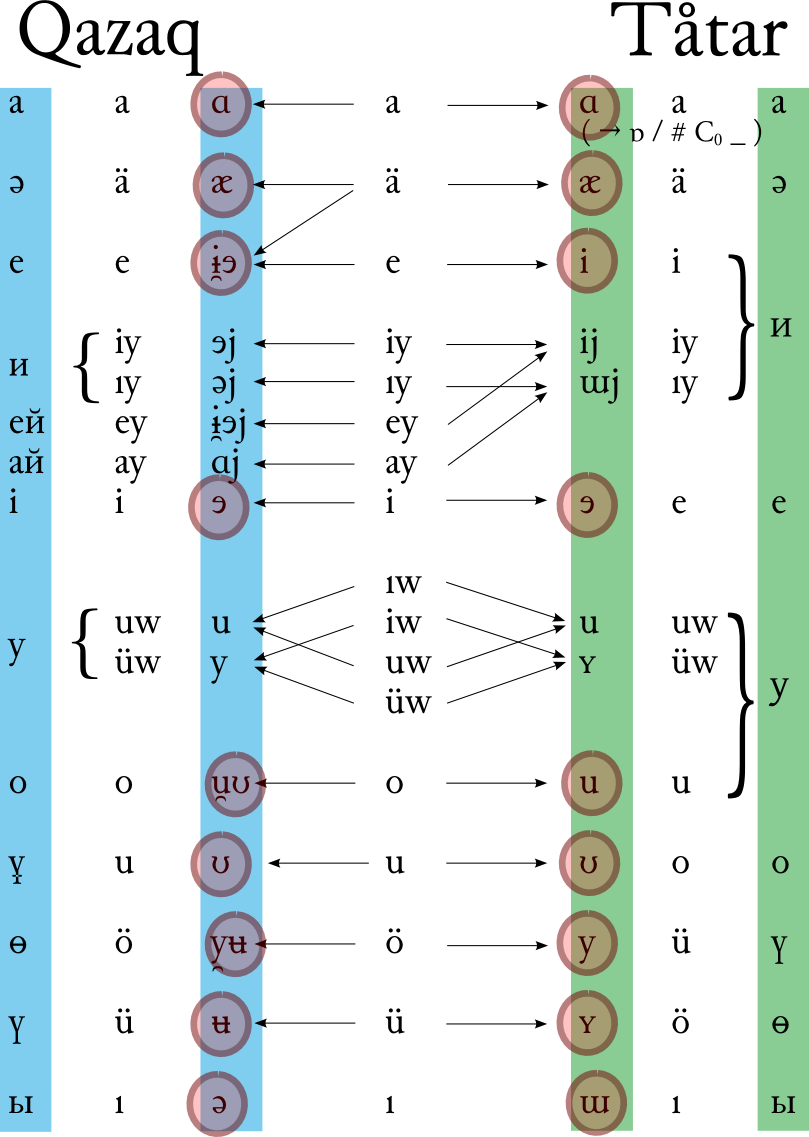Kypchak rounding harmony
|
The orthography used to represent Turkic languages on this page is a phonemic system based on Turkish orthography. |
In one dialect of Kyrgyz, there's an asymmetry in the system of vowel-rounding harmony.
Kazakh
In Kazakh, the roundness feature was lost on non-first syllables (except for with so-called long vowels), but rounding harmony makes up for this:
- */bu/ /kün/ > */bügün/
- */bügün/ > /bügin/ (modern orthographic/underlying form)
- /bügin/ > [bügün] (rounding harmony creates modern spoken form)
Examples of rounding harmony working:
- /jüremin/ [jürömün]
- /köremin/ [körömün]
- /sordım/ [sordum]
- /buldım/ [buldum]
Examples of rounding harmony not working:
- /turamın/ [turamın]
- /bulamın/ [bulamın]
- /soramın/ [soramın] (Kg: ?[soromun])
Kazakh's vowel system
(Note: [ū] and [ī] are just /uw/üw/ïw/ıw/ and /iy/ıy/)
As best I can tell:
- ı
- i front
- u round
- ü front, round
—
- a -high,( low?)
- o round,(-high)
- e front,(-high)
- ö front, round,-high
- ä front,-high, low
—
- features that spread: front, low, round
- features that don't spread: -high
another possibility:
- ı
- i front
- u round
- ü front, round
—
- o ATR, round
- e ATR, front
- ö ATR, front, round
- a low
- ä low, front
—
- features that spread: front, round,-ATR
- features that don't spread: ATR(?)
yet another possibility:
- ı
- i front
- u round
- ü front, round
—
- o ATR,((-high)), round
- e ATR,((-high)), front
- ö ATR,((-high)), front, round
- a -ATR,(-high,( low))
- ä -ATR,(-high,( low)), front
—
- features that spread: front, round,-ATR(?)
- features that don't spread: ATR(?)
Discussion
The latter possibilities as a description of Kazakh's vowel system are more elegant in some ways, and also account for the actual values for most of the vowels. Tatar's vowel system also makes more sense as an off-shoot of an earlier version of the latter system.
That /ä/ can progressively change /e/ to /ä/ probably works in either system:
- /däl me/ > [däl mä]
- /sälemetsiz me/ > [sälämätsiz be]
Kyrgyz
- V > [ rd] / V[ rd] C∅ __
- except not a > o / u C∅ __
